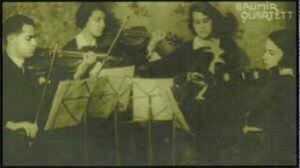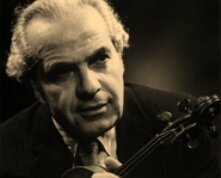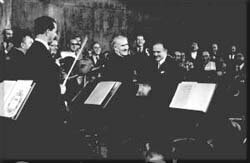
The Galimir String Quartet
© www.discogs.com/
Artistic communities shrank, yet cultural life flourished in major cities. Pupils enjoyed adequate educational infrastructure, and professionals were allowed to teach and perform unimpeded, even when stranded in foreign or enemy territory; Wanda Landowska (born in Russian Poland) continued her ground-breaking harpsichord classes at the Berlin Hochschule fur Musik (1912-19), while Sergei Diaghilev’s Ballets Russes awaited in Spain (1914-18) the return of peace, thereafter relaunching their careers during the prosperous decade of the 1920s.
In contrast, the decade preceding WWII was consumed with rival ideological responses to Great Depression poverty – and a desperate race for armed supremacy. Civilians were targeted from the outset, as aerial bombardment turned cities into battle zones: Warsaw, London, Stalingrad, Dresden, Hiroshima.
Composers and musicians were treated with particular ruthlessness, disproportionate to their numbers and political-economic influence. The turmoil of 1933-1949 actually smashed the momentum and continuity of musical craftsmanship, research and performance stretching over the 17th, 18th and triumphant 19th centuries.
Fortunately, enough great artists survived to transmit their insights to a post-War generation of students and new audiences, through live performance and recordings, notably thanks to American hospitality and technical support. Ethnic diversity, and an expanding cultural infrastructure following the Civil War, led Americans to embrace music and art in a spontaneous, respectful and non-partisan way, quite refreshing for Europeans fleeing ideological entanglements.
Foremost among these, legendary Arturo Toscanini (1867-1957) – emphatically anti-Fascist – would be the oldest conductor to survive into the 1950s. In 1937, the Radio Corporation of America set up the NBC Symphony Orchestra, a radio orchestra made up of the finest highly-paid virtuosos, to showcase his artistry in weekly concerts.

Felix Galimir© pronetoviolins.blogspot.hk/
The Galimirs belonged to the Sephardic Jewish community, which had prospered for a millennium in the Iberian peninsula – until 1492, when expulsion from reunified Spain forced their resettlement around the Mediterranean. Reaching Vienna by the 18th century, they flourished under Emperor Franz-Joseph’s 1867 Constitution, guaranteeing freedoms throughout the Austro-Hungarian Empire. The city’s overall Jewish population between 1857 and 1923 increased from 2,000 to 200,000 (10% of its 2,000,000 inhabitants), forming a significant proportion of the middle class.
These cultural transformations – experienced first-hand by Brahms, Johann Strauss II, Bruckner, Mahler, Schoenberg, Webern and Berg – would end tragically in 1938, when Austria merged with Nazi Germany.
Felix Galimir and his three sisters were mostly teenaged Conservatoire pupils when they officially formed the Galimir String Quartet in 1927 – to commemorate the 100th anniversary of Beethoven’s death.
Their Austrian mother and Romanian father’s businesses in central Vienna, though challenged during WWI, recovered sufficiently for the children to follow the best musical opportunities. Initial music lessons took place at home and in elementary school. Felix (1910-1999) and Adrienne (1912-1997) played violin, Renée (1908-1973) played viola and Marguerite (1905-1985) was a late comer to the cello.
They attended the New Vienna Conservatoire where Polish professor of chamber music, Simon Pullman (1890-1942) guided them through the “unplayable” Lyric Suite by Alban Berg (1885-1935). Berg was impressed and coached them towards a successful public performance, then gratefully dedicated Felix’ score: “To Felix Galimir, the outstanding quartet leader, famous violinist, wonderful musician, in remembrance, 9 April 1931”.
Their recording of the Lyric Suite in Paris mid-1935, would be the first ever recording of a Berg composition, broadcast in the UK in October 1935 (Gramophone), two months before the composer’s death of septicaemia. Reissued in 1991, it won a Gramophone Award.
Berg Lyric Suite (Galimir String Quartet, c. 1935)
At age 22, Felix studied with influential teacher Carl Flesch (1873-1944), First Prize pupil of Paris Conservatoire’s Martin Marsick, himself a First Prize pupil of 19th century teacher extraordinaire, Lambert Massart, the inventor of sustained vibrato.
The Galimir’s use of vibrato was very subtle, at times non-existent.
Ravel, who stopped composing due to a mysterious cerebral condition, heard them perform his quartet, and supervised its recording in Paris in 1934 – astounding virtuosity at the service of Ravel’s musical idiom!
Ravel – String Quartet – Galimir String Quartet
Again in Paris, they recorded the Darius Milhaud (1892-1974) String Quartet No 7 Op. 87, under the composer’s supervision, in 1935.
Milhaud – String Quartet no. 7 – Galimir String Quartet

The Palestine Symphony Orchestra
© www.jewishvirtuallibrary.org/
Realizing the looming danger, the siblings gave two highly acclaimed farewell concerts in Vienna and Paris in November 1936, then quickly dispersed – never again to record nor perform together as a quartet!
Felix and Renée joined the newly formed Palestine Orchestra, a refuge for outstanding European musicians ostracised by anti-Semitic laws. Toscanini conducted its inaugural concert end-1936.
Marguerite enrolled at the University of Paris, where she remained with her widowed father until the perilous first year of Nazi occupation.
The family’s ultimate salvation came through Adrienne’s 1935 marriage to American violinist Louis Krasner (1903-1995), a pupil of Lucien Capet and Carl Flesch. Inspired by a home performance of the Lyric Suite, Krasner commissioned a Violin Concerto from Berg, who completed it four months before death. Krasner premiered it posthumously in Barcelona in April 1936, before returning to NY with Adrienne in November, following the siblings’ farewell concerts.
Krasner later arranged for Felix to join the NBC Symphony in 1939. When Toscanini retired in 1954, Felix became concertmaster of the renamed Symphony of the Air, under Leopold Stokowski (who conducted Krasner in the 1940 premiere of Schoenberg’s Violin Concerto, with the Philadelphia Orchestra).
Felix founded another Galimir String Quartet with different associates, making several notable post-War recordings. It was, however, his teaching between 1954-99 on the faculties of the Marlboro Music School, Juilliard School, Curtis Institute and Mannes School of Music that secured his reputation.
Beethoven: String Quartet No.4, Morini & Galimir & Trampler & Varga (1956)
Marguerite and her father fled Paris in 1941, and settled in NY. Abandoning music, she built a costume jewellery business.
Renée, still in Palestine, married Walther Hurtig in 1944; he died in 1949. Renée finally settled in NY with her children in 1952, playing and teaching till her death in 1973.
Adrienne and Louis Krasner moved to Syracuse NY in 1949, established the Syracuse Friends of Chamber Music, and taught at Syracuse University, playing and teaching till the end of their long lives.
The Galimir String Quartet
Many Galimir family members and friends in Europe were not so lucky.
Their chamber music professor, Simon Pullman, was visiting Warsaw to sell a property when Nazi forces invaded Poland. Confined to the Ghetto, he directed the Warsaw Ghetto Symphony Orchestra until he, the orchestra and thousands more were transferred to the Treblinka concentration camp, and perished.

A most useful summary of an interesting family group.
During the stay of RENEE GALIMIR in ISRAEL -PALESTINE, she sublet the second room of our apartment. I was about 4 years old then. And I never forgot her. Her inspiration directed me to my tremendous love of music. The connection to the philharmonic orchestra is still so strong, like second family. As well my parents spoke with her in German and I learned the language out of the blue. The musicians used to rehearse in her room ,trios, quartets… I loved her very much. She stayed with us for few years, we shared our daily life together, Frau Galimir (as I was instructed to call her), was part of my early childhood.
Suddenly she disappeared. I was sad. After some time my parents said she fell in love with a British officer and went with him to Egypt. I would like very much to know if she had children and if she was happy.
Dear Neomi, I am Renee Galimir’s son and am working with some folks at the Israel Philharmonic to honor the women of the PSO. Please contact me.
Thanks, Richard
Dear Richard,
I would love to contact you and Viola. We met at Chautauqua, NY–late 50s early 60s- when your Mother played in the orchestra and we drove down from Buffalo. MY father- George Rudinger- also from Vienna- was friends with your mother’s family- had lessons from Felix, attended the wedding of Adrienne, etc. You may remember my brother- David- who was a couple years older than I. Best regards, Ann
Dear Neomi:
My great aunt Renee moved to New York with her 2 children, Viola and Richard, after her husband died. She lived in New York, residing a few blocks from her brother Felix for her entire life. Her children both have happy families of their own. Thank you for writing. I will send this to her daughter, Viola.
Regards, Rebecca (granddaughter of Adrienne)
If Krasner “arranged for Galimir to join NBC orchestra “, Maestro Arturo Toscanini already knew Felix as member of the newly created Palestine Orchestra (1936-38) violin section.
Krasner was complicit in arranging for Galimir’s guaranteed entry into the United States; Felix’s sister Adrienne, had married him in’36.
Even more significantly, Felix subsequently joined the USA 7th division Army Orchestra piccolo section.